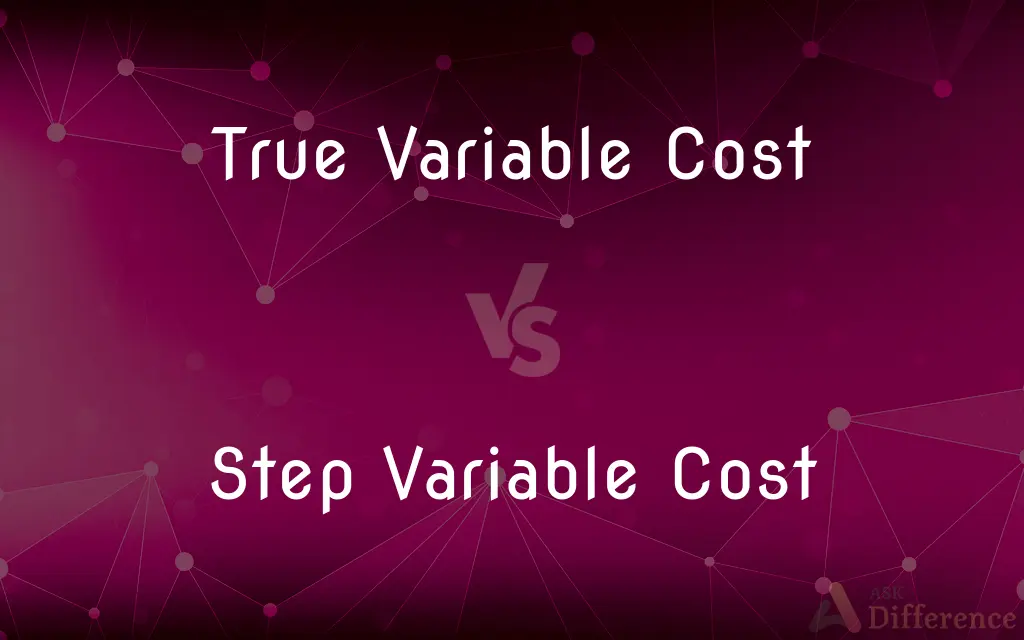True Variable Cost vs. Step Variable Cost — What's the Difference?
By Tayyaba Rehman — Published on October 4, 2023
True Variable Cost changes directly with production volume, while Step Variable Cost remains constant within certain ranges but jumps to a new level beyond those ranges.

Difference Between True Variable Cost and Step Variable Cost
Table of Contents
ADVERTISEMENT
Key Differences
True Variable Cost changes directly with production volume, while Step Variable Cost remains constant within certain ranges but jumps to a new level beyond those ranges.
2. Difference between True Variable Cost and Step Variable Cost (in separate paragraphs):
True Variable Cost and Step Variable Cost are both types of costs that businesses need to consider for budgeting, pricing, and overall financial analysis. True Variable Cost is straightforward; it fluctuates directly and proportionally with the volume of production or sales. For every additional unit produced or sold, the True Variable Cost increases by a consistent amount.
Step Variable Cost, in contrast to True Variable Cost, doesn't change uniformly. It remains constant for specific intervals or ranges of production, but once production crosses a threshold, the cost jumps to a new fixed level. This pattern continues, with the cost remaining flat until the next threshold is reached, at which point it jumps again.
A significant characteristic that distinguishes True Variable Cost from Step Variable Cost is predictability. With True Variable Costs, businesses can predict with accuracy how much the cost will increase with each additional unit. However, with Step Variable Costs, businesses must anticipate when they'll hit the next threshold and prepare for the sudden increase in costs.
ADVERTISEMENT
Another difference between True Variable Cost and Step Variable Cost lies in their representation on a graph. True Variable Costs would appear as a straight line, indicating a direct relationship with production volume. Step Variable Costs, however, would resemble a staircase, indicating the periodic jumps in cost.
From a management perspective, understanding the difference between True Variable Cost and Step Variable Cost is essential. It informs decisions related to production scaling, inventory management, and resource allocation. Recognizing the type of cost can aid in devising strategies to optimize profitability.
Comparison Chart
Behavior with Volume
Changes directly with every unit.
Remains constant within ranges.
Predictability
Highly predictable.
Predictable within ranges, jumps at thresholds.
Graphical Representation
Straight line.
Staircase-like pattern.
Nature
Continuous.
Discontinuous.
Management Consideration
Focus on per-unit cost.
Focus on production thresholds.
Compare with Definitions
True Variable Cost
Cost directly tied to activity levels.
For every additional product sold, the True Variable Cost for commissions rises.
Step Variable Cost
Cost behavior resembling a staircase on a graph.
Reviewing the graph, we noted that the cost of server hosting displayed a Step Variable Cost pattern.
True Variable Cost
Directly aligned costs with production or sales.
As sales increased during the holiday season, the True Variable Cost for gift wrapping also surged.
Step Variable Cost
An expense with periodic surges instead of continuous increases.
Warehouse rental fees are a Step Variable Cost, rising with every additional 1000 sq ft needed.
True Variable Cost
A cost that varies directly with production.
Materials used in manufacturing directly influence the True Variable Cost.
Step Variable Cost
Expense stable until a specific limit is surpassed.
Electricity bills remain flat for certain usage levels, showcasing a Step Variable Cost.
True Variable Cost
An expense increasing proportionally with volume.
The more units we produce, the higher our True Variable Cost due to packaging costs.
Step Variable Cost
A cost constant within ranges but jumps after thresholds.
Hiring another support agent increases our Step Variable Cost after every 100 tickets.
True Variable Cost
An outlay that changes with each unit.
Shipping expenses on a per-item basis represent a True Variable Cost.
Step Variable Cost
Periodically adjusted cost based on production levels.
Our production facility has a Step Variable Cost pattern for machine maintenance.
Common Curiosities
What's the primary difference between True Variable Cost and Step Variable Cost?
True Variable Cost changes per unit, while Step Variable Cost remains constant within ranges and jumps after thresholds.
How does True Variable Cost behave with increased production?
True Variable Cost rises directly and proportionally with every unit increase in production.
Is True Variable Cost more predictable than Step Variable Cost?
Yes, because it has a consistent cost per unit, whereas Step Variable Cost changes at certain thresholds.
How does a Step Variable Cost appear on a graph?
It looks like a staircase, indicating periodic jumps in cost.
Which cost type requires more strategic planning?
Step Variable Cost, as businesses need to anticipate when they'll hit the next cost threshold.
Share Your Discovery

Previous Comparison
Sample Mean vs. Population Mean
Next Comparison
Rows vs. ColumnsAuthor Spotlight
Written by
Tayyaba RehmanTayyaba Rehman is a distinguished writer, currently serving as a primary contributor to askdifference.com. As a researcher in semantics and etymology, Tayyaba's passion for the complexity of languages and their distinctions has found a perfect home on the platform. Tayyaba delves into the intricacies of language, distinguishing between commonly confused words and phrases, thereby providing clarity for readers worldwide.
















































